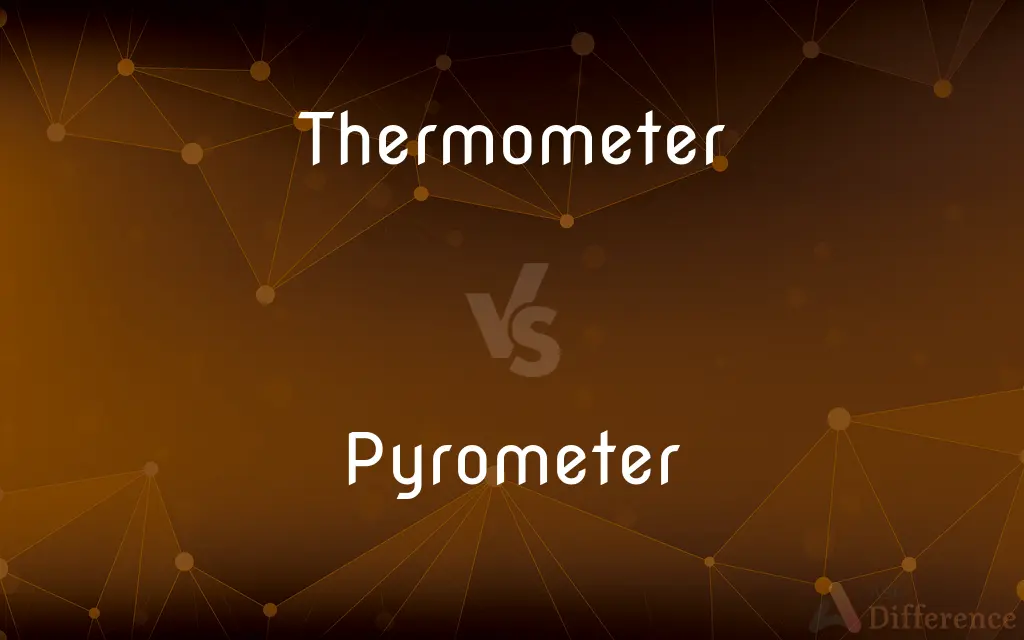Thermometer vs. Pyrometer — What's the Difference?
By Tayyaba Rehman & Fiza Rafique — Updated on January 30, 2024
A thermometer measures temperature across a wide range, often in everyday contexts. A pyrometer measures high temperatures from a distance, typically in industrial settings.

Difference Between Thermometer and Pyrometer
Table of Contents
ADVERTISEMENT
Key Differences
Thermometers and pyrometers are instruments used to measure temperature, but they serve different purposes. A thermometer is a device that measures the temperature of various substances like air, liquids, and solids. It operates over a wide temperature range and is commonly used in medical, meteorological, and household settings. In contrast, a pyrometer is specialized for measuring very high temperatures, typically in industrial processes, such as metal forging or glass production.
The design and operation of thermometers and pyrometers differ significantly. Thermometers can be mercury-based, digital, or infrared, working through direct contact with the substance whose temperature is being measured. Pyrometers, however, measure temperature from a distance, using the principle of thermal radiation. This feature makes them ideal for situations where direct contact with the object is not possible or safe.
In terms of temperature range, thermometers usually measure from about -200°C to 600°C, covering the needs of everyday applications. Pyrometers, on the other hand, are designed to measure extremely high temperatures, often from 500°C to over 3000°C, which are common in industrial environments.
The accuracy and precision of these devices also vary. Thermometers provide accurate measurements for a broad range of temperatures and are essential for precise temperature control in scientific experiments, cooking, and medical applications. Pyrometers, while accurate at high temperatures, might not provide precise readings at lower temperatures.
Usage context is a key differentiator between thermometers and pyrometers. While thermometers are ubiquitous in both professional and domestic settings, pyrometers are specialized tools found predominantly in industrial and scientific fields, where monitoring high temperatures is crucial.
ADVERTISEMENT
Comparison Chart
Purpose
Measures a wide range of temperatures.
Measures extremely high temperatures.
Operation
Often through direct contact.
Measures temperature from a distance.
Temperature Range
Usually -200°C to 600°C.
Typically 500°C to over 3000°C.
Usage Context
Medical, domestic, scientific settings.
Industrial, scientific high-temperature settings.
Design
Mercury-based, digital, infrared.
Based on thermal radiation principles.
Compare with Definitions
Thermometer
Essential for temperature control in various environments.
In the laboratory, the scientist relied on a thermometer for precise temperature measurements.
Pyrometer
Suitable for temperatures above 500°C.
In the ceramic kiln, the pyrometer indicated a temperature of 1200°C.
Thermometer
Measures temperature through direct contact or infrared technology.
The meteorologist used a thermometer to record the outdoor temperature.
Pyrometer
Measures high temperatures from a distance.
The technician used a pyrometer to measure the furnace's temperature.
Thermometer
Can be mercury, digital, or infrared in type.
I used a digital thermometer to measure the room's temperature.
Pyrometer
Essential in industrial processes like metal forging.
To ensure the steel was at the right temperature, the worker checked it with a pyrometer.
Thermometer
An instrument for measuring temperature.
The nurse used a thermometer to check the patient's fever.
Pyrometer
Non-contact temperature measurement device.
To avoid safety hazards, the engineer used a pyrometer for the high-temperature readings.
Thermometer
Used in medical, meteorological, and cooking applications.
The chef inserted a thermometer into the roast to check if it was cooked.
Pyrometer
A pyrometer is a type of remote-sensing thermometer used to measure the temperature of distant objects. Various forms of pyrometers have historically existed.
Thermometer
A thermometer is a device that measures temperature or a temperature gradient (the degree of hotness or coldness of an object). A thermometer has two important elements: (1) a temperature sensor (e.g.
Pyrometer
An instrument for measuring high temperatures, especially in furnaces and kilns
Radiation pyrometer
Optical pyrometer
Thermometer
An instrument for measuring temperature, especially one having a graduated glass tube with a bulb containing a liquid, typically mercury or colored alcohol, that expands and rises in the tube as the temperature increases.
Pyrometer
Any of various thermometers used for measuring high temperatures.
Thermometer
An apparatus used to measure temperature.
Pyrometer
A thermometer designed to measure high temperatures.
Thermometer
An instrument for measuring temperature, founded on the principle that changes of temperature in bodies are accompanied by proportional changes in their volumes or dimensions.
Pyrometer
An instrument for measuring the thermal expansion of solids.
Thermometer
Measuring instrument for measuring temperature
Pyrometer
An instrument used for measuring the expansion of solid bodies by heat.
Pyrometer
An instrument for measuring degrees of heat above those indicated by the mercurial thermometer.
Pyrometer
A thermometer designed to measure high temperatures
Pyrometer
Operates based on thermal radiation principles.
The glass blower used a pyrometer to monitor the heat of molten glass.
Common Curiosities
What is a pyrometer?
An instrument for measuring very high temperatures from a distance.
Can pyrometers measure temperature of cold objects?
Pyrometers are not accurate for low temperatures.
What is a thermometer?
A device for measuring temperature in various contexts.
Can thermometers measure extremely high temperatures?
Generally, thermometers are not designed for extremely high temperatures.
Is direct contact needed for a thermometer to work?
Yes, except for infrared thermometers.
Are thermometers safe for home use?
Yes, especially digital and infrared types.
Are pyrometers portable?
Many pyrometers are portable and handheld.
Are pyrometers used in medical settings?
No, pyrometers are primarily used in industrial settings.
What industries use pyrometers?
Metal forging, glass production, and ceramics industries.
Can thermometers measure the temperature of the air?
Yes, certain thermometers are designed for this.
What are common types of thermometers?
Mercury, digital, and infrared are common types.
How do pyrometers measure temperature?
Pyrometers measure temperature based on thermal radiation.
Can thermometers be used in cooking?
Yes, especially food thermometers for meat and baking.
What's the accuracy range of thermometers?
Depends on the type, but generally very accurate within their range.
Do pyrometers require calibration?
Yes, for accurate high-temperature measurements.
Share Your Discovery

Previous Comparison
Llama vs. Lama
Next Comparison
Libeled vs. LibelledAuthor Spotlight
Written by
Tayyaba RehmanTayyaba Rehman is a distinguished writer, currently serving as a primary contributor to askdifference.com. As a researcher in semantics and etymology, Tayyaba's passion for the complexity of languages and their distinctions has found a perfect home on the platform. Tayyaba delves into the intricacies of language, distinguishing between commonly confused words and phrases, thereby providing clarity for readers worldwide.
Co-written by
Fiza RafiqueFiza Rafique is a skilled content writer at AskDifference.com, where she meticulously refines and enhances written pieces. Drawing from her vast editorial expertise, Fiza ensures clarity, accuracy, and precision in every article. Passionate about language, she continually seeks to elevate the quality of content for readers worldwide.















































